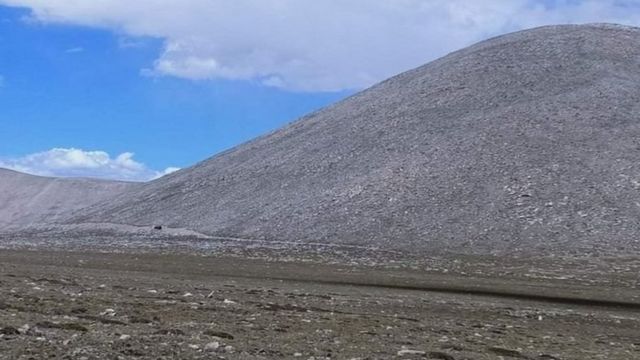MCC: Claims that there is no internal consensus within the ruling coalition, why the government wrote a letter to the United States

KATHMANDU: SEPT. 5 – Although a parliamentary session has been convened with plans to pass the US-funded Millennium Challenge Corporation (MCC), some leaders of the ruling coalition have said they have not discussed passing the agreement.
The government is preparing to pass a grant agreement worth about 60 billion Nepali rupees proposed by the United States for Nepal’s road and electrification projects.
The MCC debate has resumed after President Bidhya Devi Bhandari convened a session of both the houses of the federal parliament on September 8 on the recommendation of the cabinet.
Government spokesperson Gyanendra Bahadur Karki said that the MCC would move forward only after discussions between the parties of the alliance.
“The MCC will move forward only after a broad discussion between the two alliances,” he told the BBC.

The finance ministry has written to the US side to clarify the MCC while leaders of various parties are questioning some of the conditions for the grant.
Leaders of the Nepali Congress, which is leading the government, have been saying that an environment will be created for the passage of the MCC after the United States clarifies the question raised in Nepal.
Congress leader and former foreign minister Prakash Sharan Mahat said the prime minister was preparing to be passed by parliament after the US “allayed concerns” about the MCC in Nepal.
“The prime minister is working to ensure that the United States addresses some of the concerns raised in the MCC’s provisions and that it is passed by parliament,” Mahat said.
‘No discussion’ with Maoists
But Dev Gurung, chief whip of the CPN-Maoist, a major power partner, says they have not had any discussions about passing the MCC.
“Discussions on the MCC have not started with a proposal in a five-party all-party meeting. It may be someone’s wish, but it is not a situation where discussions have taken place in that way,” he said.
Gurung claims that the government’s letter to the US side indicates that the MCC will not be passed in the status quo.
He said the MCC would not pass if the United States was not ready to amend the agreement.
“He said the United States should not be ready to amend the agreement. If it was not ready, this chapter would be closed.
Decision ‘depends’ on US response
Leader Gurung said that the agreement on the economic project did not need to be passed by the parliamentarians, but said that it could be passed if the other party in the alliance, the CPN-Unified Socialist Party leader Virodh Khatiwada, raised concerns about the MCC.
He said in a letter to the US Treasury Department that the agreement would be passed by parliament.
“The government has sent a letter to clarify about the MCC. It depends on what they answer to the 11 questions asked by the government,” said Virodh Khatiwada, leader of the coalition’s CPN-Unified Socialists.

He said that the leaders of the ruling parties wanted to be clear on the ownership of the land to be used for the project, accountability of the funds received for the grant, and whether there would be a dispute over the project or not.
In a letter to the MCC, the Treasury Department also asked whether the grant was part of the US Indo-Pacific strategy.
The government has urged the United States to clarify this before the upcoming visit of MCC Vice President Fatima G. Schumer and Assistant Vice President for Asia Jonathan Brooks to Nepal.
Former Ambassador of Nepal to India Deep Kumar Upadhyay says that it is good that the government is trying to clarify about MCC.
“What the government has said is a good thing to remove the ambiguity in it. The answer should also be made public in a transparent manner,” he said.
What does UML say?
Former Prime Minister KP Oli, who was earlier seen in favour of the MCC, on Saturday expressed concern that the government was trying to pass the MCC “by deception”. Oli said the government had not consulted them about the MCC.
However, UML chief whip Vishal Bhattarai said that his party would protest against the role of speaker in the upcoming parliament, the incident of Jaisingh Dhami falling from the Tuin in the Mahakali River and the border dispute with China.
“Our party has not yet made up its mind on what to do about the MCC in the House but there is opposition in our House over the role of the Speaker and the Election Commission is not removing the MPs we have removed.

The opposition has accused the government of failing in its diplomacy with neighbouring India and China as it prepares to pass the MCC.
Prime Minister Sher Bahadur Deuba has not been able to appoint 17 ministers, including foreign ministers, even after a long time since the formation of the government under his leadership.
Experts say the government has not been able to show diplomatic maturity with neighbouring countries in the absence of a responsible minister.
Criticism of the government on other issues as well
Locals and their families have alleged that Jaisingh Dhami of Darchula went missing after falling into the Mahakali River after Tuin (iron made rope) being cut by the Indian Border Security Force.
A committee of the Home Ministry set up to investigate the incident said that the incident of disappearance of Dhami appeared to have taken place in the presence of SSB and recommended to take the diplomatic initiative to investigate them.

But last year, a spokesman for India’s foreign ministry said Nepal had not informed India of the allegations.
While the government was accusing the government of failing to demand an answer from India in the case of Dhami’s disappearance, the issue of an Indian helicopter flying over Nepali territory in Darchula without permission came to light.
Experts on diplomatic issues say the government has not been able to raise objections with India through diplomatic channels on both issues.
“It seems that the government does not want to move forward on this issue. The Indian ambassador could have been called to draw attention to the incident. The Nepali ambassador could also have drawn the attention of the Indian Ministry of External Affairs,” said Deep Kumar Upadhyay, former ambassador to India.
Upadhyaya Nepal says that he failed to show diplomatic maturity in this incident.
Former Ambassador to China Tanka Karki understands that Nepal’s southern neighbour India has remained silent on the issue without questioning both issues.
“Anti-India sentiment should not work, but the problem between the two countries should not be suppressed for a long time, it should be resolved,” Karki said.
The government has decided to form a committee to study the Nepal-China border issue in Humla from the cabinet meeting last Wednesday.
Reacting immediately to the government’s decision, the Chinese embassy in Kathmandu reiterated that the border issue between Nepal and China had been resolved in the 1960s.

A spokesman for the Chinese embassy in Kathmandu said on Friday that “some people have tried to raise the Sino-Nepalese border dispute before, but Nepal’s foreign ministry has made it clear.”
An expert on foreign affairs said the government had raised the issue with China, which was not necessary.
“It is unfortunate that those in power, in particular, are indulging in foreign policy to further their own interests,” said Tank Karki, a former ambassador to China.
When the Nepali Congress was in opposition, it had raised the issue of the Chinese side building structures by encroaching on Nepali land in the Hilla area of Humla last year. When questions were raised about the border, then-Foreign Minister Pradip Gyawali said the structures were built on Chinese soil.
This problem has come to the fore again a month after the arrival of the Congress government when the Council of Ministers formed an investigation committee under the coordination of the Joint Secretary of the Ministry of Home Affairs. According to Karki, the border issue with China has been raised at a time when the government has been criticized for failing to question India in the Darchula Tuin case and the helicopter case.
How is Nepal’s diplomacy?
“When asked about India, he seems to be unnecessarily mixing with China to get angry,” says Karki. “This way of sustaining the government by playing on foreign policy can increase instability in Nepal by making foreigners more active.”
Karki’s view is that Nepal’s governments have recently “lost balance” in foreign policy.
Deep Kumar Upadhyaya, who has already become Nepal’s ambassador to India, says Nepal has not shown diplomatic maturity in both cases.
“There are many visible and invisible things in diplomacy. Peaceful result-oriented work is the basis of successful diplomacy. Even if we were informed about the border with China, both sides could have formed a joint team to be clear,” says Upadhyay.
“We have to show a little bit of maturity in that too. If we act and react immediately, it can lead to problems. China may not be different, India may not be different – a country like ours may be very different,” he said.
Nepal, which had earlier said it would help China when the US demanded an investigation into the origin of the coronavirus, has now changed its mind. Earlier, it was said that Nepal had stated in the United Nations that it should not politicize the origin of the virus.
But experts say China is dissatisfied with Nepal’s new statement to the United Nations and that Beijing could be further irritated by the current government over border disputes.









